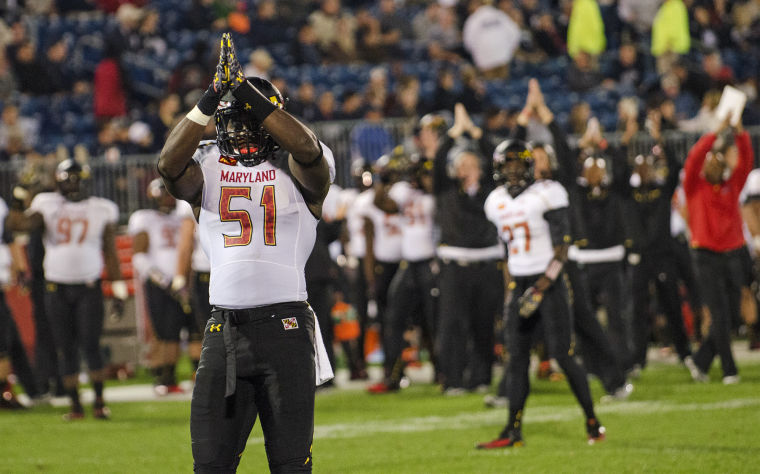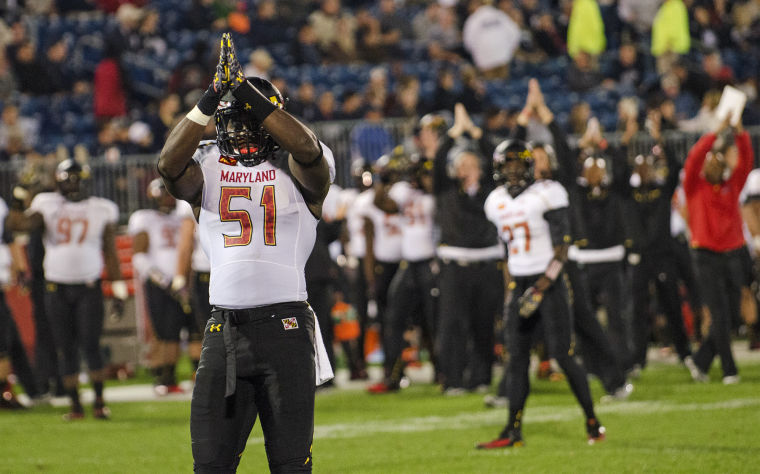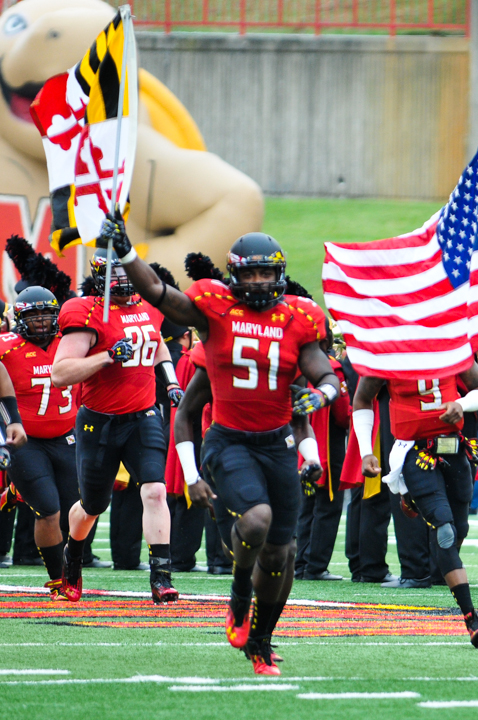Recruiting interest in Yannik Cudjoe-Virgil entering his senior year at Towson High School in 2009 was tepid.
The future Terrapins football outside linebacker didn’t show well at a junior combine at M&T Bank Stadium in Baltimore. Towson wasn’t a public school power, and it was overshadowed by private schools in the area. Towson University showed slight interest but ultimately backed off.
So after graduation, Cudjoe-Virgil set out on a journey that started in western Pennsylvania and brought him back to his home state and to College Park. He thrived during the Terps’ 5-1 start until a pectoralis injury ended his season in Saturday’s game against Virginia.
“It’s tough because you feel bad for anybody when they get a season-ending injury, but especially for a guy like Yannik,” coach Randy Edsall said. “That guy just works his tail off each and every day to be the best he can be. He gives great effort in classroom, gives it in the weight room, gives it on the practice field, was playing well. You feel for him. You really do.”
One of the Terps’ best pass rushers, Cudjoe-Virgil made an immediate impact this season. He was third on the Terps with three sacks and also pulled in an interception in the Terps’ 37-0 win over West Virginia in Baltimore on Sept. 21.
But for many of the Terps, it was how Cudjoe-Virgil ended up at this university that established his influence on the team. It wasn’t just his production on the field — it was how he got to the point in which he could be one of the Terps’ top defensive players.
“He’s a good leader,” Edsall said in August. “Unbelievable work ethic, just unbelievable work ethic. That guy, ever since the day he got here, to be and set a standard. If a linebacker ever wants to know what it takes to work, they should just go with Yannik and be with him.”
UNHERALDED PROSPECT
While recruiters and scouts flooded the likes of DeMatha and Good Counsel in the Washington area and Gilman and Loyola Blakefield in the Baltimore area, Cudjoe-Virgil toiled in relative anonymity at Towson. A Trinidadian immigrant, he felt he was good enough to play Division I football, but he was never offered the chance.
So he set out to Seton Hill University, a Division II school in Greensburg, Pa., a town of fewer than 15,000 located about 45 minutes east of Pittsburgh.
“They kind of overlook you if the team has a bad record,” Cudjoe-Virgil said in September. “They’ll probably assume that it’s not any good players or not worth my time even going there. So I mean, it is what it is. I can’t do anything about it right now.”
When he was at Seton Hill, Cudjoe-Virgil said he felt like he was destined for more. He didn’t feel like he was meant to be playing for small crowds in small stadiums in small towns despite recording five sacks and blocking a school-record six kicks in his sophomore year. And after the Griffins went 3-19 in his two years in Greensburg, Cudjoe-Virgil decided it was time to make a change.
He wanted to be closer to his mother, Marilyn Missouri, and he wanted to play on a bigger stage.
So he took a chance.
‘MY HEART DROPPED’
Cudjoe-Virgil’s decision to transfer to this university was just the start of the process. He had to apply and get accepted. Even then, he still had to make the team.
The university accepted Cudjoe-Virgil, a kinesiology major, and his next step was to send his tape to Terps defensive line coach Greg Gattuso.
One night, Cudjoe-Virgil’s phone rang.
“I didn’t know who it was,” he recounted in September. “[Gattuso] left me a voicemail. He said it was a coach from University of Maryland. My heart dropped. I was like, ‘I got to call him back like right now.’ I called him back and he just said, ‘Come up here. Come talk to us and see where we’re going to go.’”
Cudjoe-Virgil made the team, but he still had work to do. He was a walk-on for the fall 2012 semester and had to pay his way through school. It burdened his family, he said, and he spent the summer working a security job and taking an extra class in addition to the Terps’ offseason workouts.
“I’ve always been a work ethic guy,” Cudjoe-Virgil said. “I think all my coaches will say I always work hard. I get that from my mother, too. She’s always worked hard, so I think that’s where I get my work ethic from. Just always going out there with a chip on my shoulder, saying I could be better than this.”
Soon, Cudjoe-Virgil was working his way into the Terps’ linebacker rotation. He battled with Marcus Whitfield for a starting outside linebacker spot, and though Whitfield won the starting job, Cudjoe-Virgil still played extensively. Edsall often talks about trying to put the Terps’ best players on the field at the same time, and Cudjoe-Virgil made sure there was no reason to be absent when the Terps took the field for a game.
“Cudjoe just has a different attitude on things,” outside linebackers coach Lyndon Johnson said at the team’s media day in August. “He wants to be good. He wants to play. He just has a natural motor, a built-in motor where he’s just going to keep coming. He’s not afraid to make mistakes, which I think is probably his largest asset. He may not be as athletic as some guys naturally, but he goes so fast and when he makes a mistake, he can recover.”
Everything Cudjoe-Virgil had worked for came to fruition in the first weeks of the season. In the West Virginia game, playing before friends and family at an NFL stadium, his second-quarter interception set up a touchdown to put the Terps up 30-0 entering halftime.
An unheralded recruit, Cudjoe-Virgil was proving the worth of his hard work.
“He sure practices or plays like he has a chip on his shoulder,” defensive coordinator Brian Stewart said earlier this season. “I don’t talk to him about that specifically, but he does practice and play like that.”
A LOUD ABSENCE
While he integrated himself into the Terps’ defensive schemes on the field, Cudjoe-Virgil also took on a significant leadership role. Though he had never played a snap in live game action in College Park, the coaching staff placed Cudjoe-Virgil on the team’s leadership council before the season began.
“He’s a vocal guy,” Johnson said. “He’s not a quiet guy. Guys listen to him because he does do it the right way. He does it the right way in the classroom. He does it the right way in the field. The guys can’t really knock against him and say, ‘Why listen to him?’”
And that made it that much more difficult for the Terps when Cudjoe-Virgil’s injury was announced Monday night — though some players don’t expect him to stray too far.
“It’s definitely hard to see somebody go down with a season-ending injury, but all you got to do is give them as much support as they need, and then he’s also been out there being a leader,” Whitfield said yesterday. “It’s almost as if he hasn’t even left off the field. He’ll definitely be at practice today.”
Cudjoe-Virgil will have surgery Friday, Edsall said, and then begin a rehab process with the goal of returning and contributing in his redshirt senior year in College Park. He’s the second member of the Terps’ defense to suffer a season-ending injury, as cornerback Dexter McDougle is out for the year with a shoulder injury suffered at Connecticut on Sept. 14.
“That’s just the nature of the business,” Edsall said. “But I feel bad for [Cudjoe-Virgil] because I know he epitomizes everything I want to see in a football student-athlete here in Maryland.”
Besides, the hard work of a rehab process shouldn’t be anything new for Cudjoe-Virgil. He’s shown time and time again during his career that he’s willing to do what it takes to get what he thinks he deserves.
Even if it does involve a little risk.
“I just took the chance, prayed,” Cudjoe-Virgil said in September. “I got this opportunity, I got to be on scholarship. I got to get playing time. It’s all worth it. I’ll never think twice about what I did.”
Outside linebacker Yannik Cudjoe-Virgil celebrates after the defense forced intentional grounding in the end zone for a safety during the Terps’ 32-21 win over the Connecticut on Sept. 14, 2013.
Outside linebacker Yannik Cudjoe-Virgil leads the Terps onto the field at Byrd Stadium before their 27-26 win over Virginia on Oct. 12, 2013.





